Energy bills can climb fast during the hottest or coldest months of the year. While keeping your home comfortable is non-negotiable, many homeowners overlook simple ways to reduce HVAC energy waste. Improving HVAC system efficiency is one of the most impactful actions you can take for your budget and indoor comfort.
With the right knowledge and habits, you can optimize performance, extend equipment lifespan, and reduce monthly energy costs, all without sacrificing the comfort of your home.
Regular Filter Replacement Matters More Than You Think
Clogged or dirty filters are one of the most common reasons HVAC systems underperform. When air filters become saturated with dust, pet dander, and debris, airflow is restricted. That makes your system work harder to push air through, increasing wear and tear.
Replacing your filter every one to three months helps maintain optimal airflow and improves indoor air quality. It’s a low-cost habit that protects the system and keeps energy consumption in check. During high-use seasons, checking filters monthly can prevent small problems from becoming bigger and more expensive.
Seal and Insulate to Prevent Energy Waste
Even a powerful HVAC system can’t overcome poor insulation or gaps in your home’s structure. Leaky windows, unsealed doors, and poorly insulated attics allow treated air to escape. This means your system runs more often than necessary to maintain temperature.
Adding weather stripping, using caulk around window frames, and improving attic insulation are simple upgrades that pay off quickly. By minimizing the escape of heated or cooled air, you reduce the strain on your system and create a more stable indoor climate.
Upgrade to a Smart Thermostat
Manual thermostats offer very little control and often lead to wasted energy. Programmable thermostats help, but smart thermostats take savings to the next level. These devices learn your habits and adjust temperatures automatically based on occupancy, weather conditions, or even the time of day.
Some models let you control settings remotely from your phone, making it easier to manage usage while you’re away from home. Over time, these features translate to more consistent temperatures and lower bills without constant manual input.
Don’t Skip Annual Maintenance Visits
Routine checkups from a qualified technician catch small problems before they become costly failures. Over time, systems lose efficiency as components wear down or collect buildup. A yearly tune-up includes cleaning coils, checking refrigerant levels, testing safety systems, and verifying overall performance.
Preventive maintenance improves efficiency, extends equipment life, and ensures you’re not caught off guard by a breakdown during peak season. Reputable heating and cooling experts can help identify specific improvements for your unit’s make and model. Their inspections also offer peace of mind, especially before a long, hot summer or chilly winter.
Use Ceiling Fans to Complement Your HVAC System
Ceiling fans don’t actually cool the air, but they create a wind-chill effect that helps rooms feel cooler in summer and warmer in winter. In warmer months, fans should spin counterclockwise to push air downward. In colder months, reversing the direction helps circulate warm air that rises to the ceiling.
By using fans properly, you can set your thermostat a few degrees higher or lower without affecting comfort. This small adjustment can lead to meaningful savings over the course of the year.
Keep Vents Clear and Ducts Clean
Blocked or closed vents disrupt the balance of airflow throughout your home. Make sure furniture, rugs, or curtains aren’t obstructing vents or returns. Even one blocked vent can make your system work harder and lead to uneven heating or cooling.
In addition, consider having your ducts cleaned every few years. Over time, dust, mold, or even pests can compromise the air traveling through your system. Clean ducts improve air quality and support better system performance.
Limit Heat Gain from Direct Sunlight
During summer, direct sunlight through windows can dramatically raise indoor temperatures. This forces your HVAC system to run longer and use more energy. Closing blinds or curtains during peak sunlight hours, especially on south- and west-facing windows, can reduce heat gain.
Reflective window films or insulated drapes are also helpful tools. These passive strategies reduce how hard your system needs to work and help keep interior spaces cooler naturally. Every degree matters when you’re trying to lower energy use without sacrificing comfort.
Invest in a System Sized for Your Space
Bigger isn’t always better when it comes to HVAC equipment. An oversized system may cycle on and off frequently, which wears down components and reduces efficiency. An undersized system, on the other hand, will struggle to keep up, especially in extreme temperatures.
Proper sizing depends on multiple factors, including square footage, insulation levels, ceiling height, and even window placement. A professional load calculation can determine the right system size to ensure optimal performance year-round.
Use Zoning Systems for Greater Control
Zoning allows you to control the temperature in different areas of your home independently. This is especially useful in homes with multiple floors or rooms that are rarely used. Instead of conditioning the entire home to a single temperature, zoning directs airflow only where it’s needed.
This added control reduces energy waste and can improve comfort for everyone in the house. Whether it’s a cooler bedroom at night or a warmer home office during the day, zoning gives you flexibility without overworking the system.
Energy-efficient HVAC habits don’t have to be complicated. Simple actions like regular filter changes, sealing leaks, and investing in modern technology can go a long way in improving comfort and saving money. With a little planning and the right help, your home can stay cool through summer and warm through winter, without breaking the bank.



